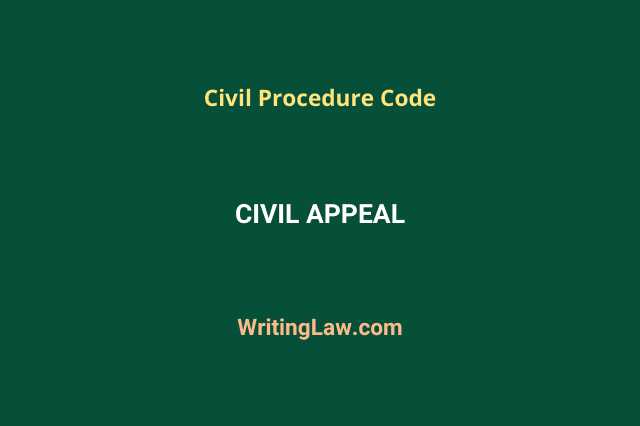
If a person feels aggrieved by a court’s decree or order, he may file an appeal in a higher court if an appeal is available against that decree or order.
Sections 96 to 112 and Orders 41 to 45 of the Civil Procedure Code, 1908 contain provisions relating to appeals.
- Sections 96 to 99A, 107, and Orders 41 deal with first appeal.
- Second appeal is dealt with under sections 100 to 103, 107, and 108, as well as Order 42.
- Appeals from Orders are covered by sections 104 to 108 and Order 43.
- Appeal by an indigent person is given under Order 44.
- Appeal to Supreme Court is given under sections 109 and 112 and Order 45.
This CPC law note tells you about first appeal (civil appeal) as per the Civil Procedure Code, 1908, with requirements, procedure, and more.
Must See: What Are Second Appeals Under Civil Law
Appeal From Original Decree
A first appeal can be filed against a decree issued by a court with original jurisdiction.
Section 96 of the Civil Procedure Code (CPC) establishes the right to appeal from any decree issued by any court with original jurisdiction.
An ex-parte decree can be appealed against under section 96(2) of CPC.
Section 96(3) of the Civil Procedure Code is based on the principle of estoppel and bars an appeal against a consent decree.
Section 96(4) of the Civil Procedure Code bars appeal in petty cases.
In Zair Husain vs Khurshed Jan ILR 1906 28 All 545, the High Court of Allahabad stated that a litigant has independently of any statute, a right to institute any suit of a civil nature in one court or another. The court also stated that the right of appeal is not to be assumed in any matter which comes before the court. Such right must be given by statute or by some authority equivalent to a statute.
Requirements for Presentation of an Appeal
The requirements for the presentation of an appeal as per the Civil Procedure Code are as follows:
- It must be in the form of a memorandum.
- It must be signed by the appellant or his pleader.
- A certified copy of the judgement must accompany the memorandum.
Presentation of Appeal
When an appeal is presented, the court must endorse it and record it in the register of appeals.
Stay of Proceedings
The Civil Procedure Code, Order 41 Rule 5, provides for a stay of execution of a decree or order. Following the filing of an appeal, the appellate court may order a stay of proceedings or execution of the decree. However, simply filing an appeal does not suspend the operation of the decree. If sufficient grounds are established, a stay of execution may be granted.
Summary Dismissal of an Appeal
Order 41 Rule 11 of the Civil Procedure Code embodies the general rule that whenever an appeal is filed, the appellate court has the authority to dismiss the appeal summarily if, after hearing the appellant or his pleader, there appears to be no substance in it.
Procedure at the Hearing of an Appeal
The appellant has a right to begin. If the court finds that the appeal lacks substance after hearing the appellant, it may dismiss the appeal without calling the respondent to reply.
If the appellate court does not dismiss the appeal, the respondent will be heard, and the appellant will be given the opportunity to reply.
If the appellant does not respond when the appeal is called for hearing, the appeal may be dismissed in default.
When in a hearing of the appeal, neither the appellant appears nor the respondent, then the appeal is dismissed ex-parte.
Cross Objection
Order 41 Rule 22 of the Civil Procedure Code contains a special provision that allows a respondent who has not filed an appeal against the decree to object to it by filing a cross objection in the opposite party’s appeal.
Powers of an Appellate Court
The appellate court has the following powers:
- Power to decide the case finally.
- Power to remand.
- Power to frame issues and refer them for trial.
- Power to take additional evidence.
- Power to modify the decree.
Read Next:
1. Criminal Appeal and Its Kind Under CrPC
2. Delay in Civil Litigation – Dangers, Causes, and Suggestions
- What Is a Foreign Judgement and When It’s Not Binding in India - 26th July 2022
- What Are Second Appeals Under Civil Law - 23rd June 2022
- Civil Appeal as Per the Civil Procedure Code - 12th June 2022







